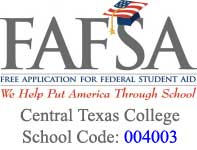The Office of Student Financial Aid staff is committed to helping students pay educational expenses through part-time employment. The Work-Study Programs foster community service and provide real-life experience relevant to your program of study.
The work-study programs at CTC are intended to:
- Instill a positive attitude toward work.
- Teach students good work habits.
- Improve student access, success, and completion of higher education.
- Provide students with valuable learning experiences while doing worthwhile work.
- Meet the needs of the college in performing day-to-day operations.
- Help students meet educational expenses.
CTC firmly believes that meaningful, rewarding work experience is an educational benefit of lasting value.
Work-Study Program
Students complete an application showing the skills they possess (i.e., typing, filing, computer skills, etc.) and interests. Supervisors from various campus departments with vacant positions review the work-study applications and interview those students most suited to determine who will be hired.
Are You Eligible?
Participation in the Work-Study Program is based upon need as determined by federal methodology using information from the FAFSA. In addition, students must be enrolled and remain at half-time status to be eligible for the work-study programs, as well as meet the minimum requirement of academic progress which is a cumulative grade point average (GPA) of 2.0 each semester. Please review the following Eligibility Questionnaire and program overviews.
- Have you completed the FASFA?
- Have you completed your CTC Financial Aid Checklist?
- Are you meeting Satisfactory Academic Progress for Financial Aid and have at least a 2.0 or higher GPA?
- Are you enrolled in at least 6 credit hours (Note: 12 clock hours per week for CATE Center students)?
- Are you eligible for employment in the US?
Job Opportunities
While we cannot guarantee placement for every applicant there are over 30 departments participating in these programs across campus. You can view the possibilities here.
Hiring Process
- Completely fill out the CTC Work-Study Application via Etrieve and submit
- Once submitted, the Financial Aid Office will review your application for completeness, eligibility, and enrollment before making it available to department supervisors for review.
- The hiring supervisor of each department will contact you directly if selected for an interview (make sure you list a phone number and email address that you will be able to answer).
- If selected for hire, a background check will be conducted.
- After the background check is completed and if eligible, a Financial Aid Representative will contact you to begin the onboarding process. You will need your social security card, valid government-issued photo ID, and direct deposit information for your onboarding appointment. (Direct deposit is a condition of employment at Central Texas College).
- After onboarding is completed, you must contact your supervisor to arrange your schedule.
Payroll Process
Work-Study Program students may work a maximum of 19.5 hours per week at a rate of $9.18 per hour. Students must submit timesheets according to an annual payroll calendar and are paid bi-monthly on the 15th and the last working day of the month. Funds are deposited directly to the student's bank account which is arranged with the Payroll Office upon being hired. All earnings are subject to federal income taxes. Students will complete a W-4 form as part of the hiring process for any work-study position. A W-2 Wage and Tax Statement is made available at the close of each calendar year either in electronic format through Eagle Self-Service only when consent is given, or by mail to all work-study students. One important advantage for students participating in the Federal Work-Study Program is that taxable earnings from need-based employment programs are not counted toward the next year's contribution for financial aid. Students simply report additional financial information when completing the FAFSA.



